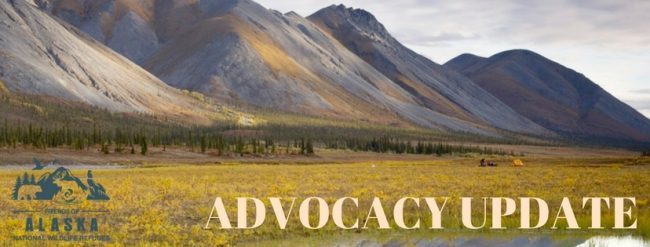In 2018, we were confronted by many important threats to our National Wildlife Refuges and Parks in Alaska and the Nation. Friends are at the forefront of efforts to prevent the Administration from permanently damaging habitat and wildlife and giving away lands in national conservation units. Below are the major actions in which we have participated along with our many conservation partners.
Izembek Land Trade and Road
Secretary Zinke and his staff undertook a series of secret negotiations that resulted in a land trade with those who have pushed for an unnecessary and costly road through the heart of the Izembek Wilderness. The Friends organization is the lead plaintiff along with eight other conservation organizations in the lawsuit filed in the Anchorage Federal District Court that challenges the proposed land trade and road. We are represented by Trustees for Alaska that has performed excellent legal work on behalf of the conservation organizations. Everything has been submitted and argued, we and await a ruling by the Court on our motion for summary judgment.
Oil Drilling in the Arctic Coastal Plain
The criticism continues concerning the DOI fast-track goal of completing a draft environmental statement (DEIS) for oil leasing in less than six months. The environmental assessment for the proposed seismic testing has not been issued by BLM but could occur very soon. For a summary of the potential risks and impacts from seismic activity, click on the Alaska Wilderness League fact sheet here. We expect that the potential environmental impacts of seismic exploration and lease sales will not be adequately addressed and documented, which would result in extensive litigation by national organizations and Friends challenging these proposed actions.
Predator Control
Friends and 14 other organizations intervened in the lawsuit by the State of Alaska and Safari Clubs International that challenged the National Park Service 2015 predator control regulations. The case was put on hold until December 10, 2018, because the Park Service was ordered by the DOI to issue revised regulations. We joined the other organizations in comments drafted by Trustees for Alaska opposing the revised regulations. We await the outcome of that process.
Kenai Revised Regulations
The USFWS is preparing revisions to the regulations regarding hunting and access in the Kenai National Wildlife Refuge. This revision was ordered by DOI to accommodate the long-standing efforts of the State of Alaska to dramatically increase hunting and motorized access on the Refuge. As with the similar DOI orders to the National Park Service, their plan is to eliminate long-standing protections to habitat and wildlife on national wildlife refuges. We expect that the Department of Interior will require the Refuge to accept the demands of the State to allow baiting of brown bears and off-road vehicle access during the winter, but expanded hunting in the Skilak Wildlife Recreation Area along the Skilak Loop Road may not be addressed until later. We are closely monitoring this process and working with our conservation partners to prevent or minimize these destructive regulations.
Hovercrafts on Navigable Waters
Together with the National Parks Conservation Association and other organizations, Friends entered an amicus brief in Sturgeon v. Masica in opposition to Sturgeon’s claim that, contrary to National Park Service regulations, he can operate his hovercraft on the navigable waters of Yukon-Charley Rivers National Preserve. After the Ninth Circuit Federal Court of Appeals denied his claim, the case was accepted by the U.S. Supreme Court, which has not yet issued its decision.
Alaska Native Veterans Land Allotment Equity Act
Senator Sullivan’s bill to amend the Alaska Native Claims Settlement Act represents a major threat to federal conservation units in Alaska. It would revise provisions regarding land allotments for Alaska Native Vietnam veterans. Eligibility is expanded to include all Alaska Native veterans who served between August 5, 1964, and May 7, 1975. Allotments may be selected from vacant federal lands or lands that have been selected or conveyed to the State of Alaska or an Alaska Native corporation, if the State or corporation relinquishes or conveys the land to the United States for allotment. An heir of a deceased eligible veteran, regardless of the cause of death, may apply for and receive an allotment. We are following the progress of this legislation and hope that it will not become law.
On behalf of our Board of Directors, I wish you all a wonderful Holiday Season and a New Year filled with conservation victories against the forces of darkness!
by David Raskin, Friends Board President
